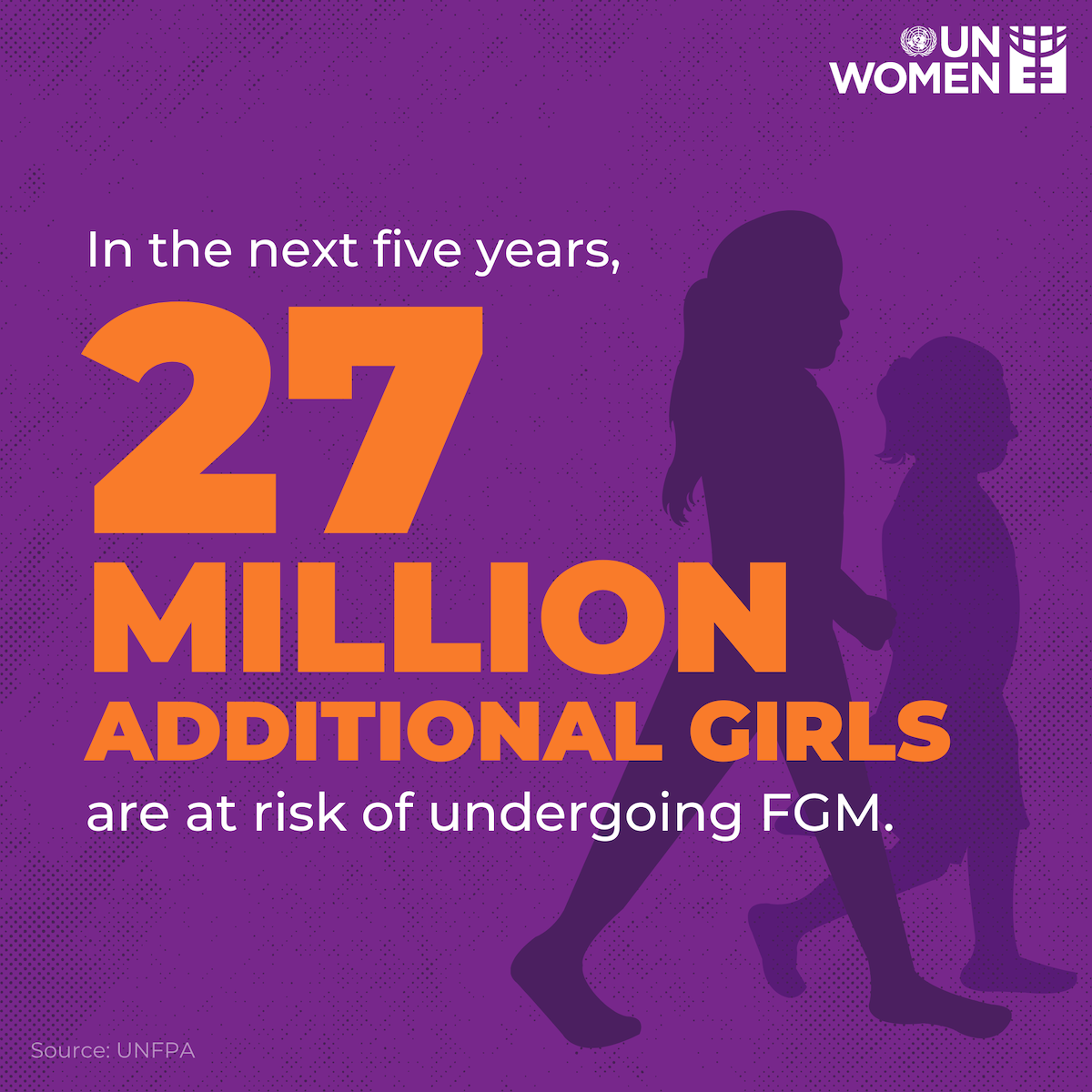Five years to zero: the Race to end FGM by 2030
Date:
Strengthening alliances and building movements to end FGM in Eastern and Southern Africa

Joint statement by UNFPA, UNICEF, UN Women, Equality Now, Deutsche Gesellschaft für Internationale Zusammenarbeit (GIZ)and The Eastern African Sub-Regional Support Initiative for the Advancement of Women (EASSI) on the International Day of Zero Tolerance for FGM
Fatuma was only ten when she overheard whispers about her “special day.”
In her village in Oromia, Ethiopia, the ritual was celebrated as a rite of passage, a moment that would define her future. But Fatuma’s mother had different plans. Gripping her daughter’s hand firmly, she walked silently for miles to a safe house where girls were protected from female genital mutilation (FGM). “I wanted her to dream beyond our traditions, to go to school, to be free,” her mother said. Today, Fatuma is a university student, an advocate, and a voice for millions of girls who still face this harmful practice.
On this International Day of Zero Tolerance for FGM, UNFPA, UNICEF, UN Women, alongside EASSI, Equality Now, GIZ, and partners, are calling for an end to FGM in all its forms once and for all. This year’s theme, Stepping Up the Pace: Strengthening Alliances and Building Movements to End FGM, is a reminder that we must move collectively and rapidly to eliminate this grave violation of human rights.
A persistent violation of rights
FGM affects over 230 million women and girls worldwide, subjecting them to severe physical and psychological harm. In Eastern and Southern Africa alone, 42 million women and girls have undergone this harmful practice. While progress has been made—Ethiopia has reduced adolescent FGM rates from 68 per cent to 47 per cent in the last decade, and Kenya from 13 per cent to 9 per cent —but the numbers remain staggering. In Somalia, prevalence remains at 99 per cent.
Ending FGM requires more than just policies and laws—it demands a movement. Governments, civil society organizations, including women’s rights and youth groups, faith-based institutions, and the private sector must unite in unprecedented ways. As Mercy Yego Chelangat, Regional President for East and Southern Africa of the Global Youth Consortium Against FGM, powerfully states: “When we join hands—whether across villages or borders—our collective effort becomes a movement that dismantles harmful practices and protects generations to come.”
The role of national and regional task forces in fighting FGM is critical. Already, five countries —Eritrea, Ethiopia, Kenya, Tanzania and Uganda—have enacted laws, developed national action plans, and allocated budgets to tackle FGM. But we need harmonized cross-border responses, recognizing that FGM does not stop at national borders. The recent momentum behind the East African Community (EAC) Bill on FGM, supported by civil society and regional governments, is a critical step forward.
The fight against FGM is being transformed by women- and youth-led organizations. Groups like the Global Youth Consortium against FGM, Equality Now, EASSI, Frontline Ending FGM, Power to You(th) and the Strategic Initiative for Women in the Horn of Africa (SIHA) are bringing new energy, innovative dialogues, and legal advocacy to communities. These organizations are reaching remote villages, challenging entrenched norms, and fostering intergenerational alliances.
Faith-based leaders and traditional elders also hold immense power in shifting cultural perceptions. By engaging religious institutions and community elders, we are seeing growing acceptance that FGM is not a religious requirement but a harmful practice that denies girls their fundamental rights.
The road ahead
In 2025, we will intensify our efforts by working with the African Union to drive the adoption and ratification of the Convention on Ending Violence against Women and Girls. Through the Saleema Initiative, and the Spotlight Initiative Africa Regional Programmes, we will ensure that legislative frameworks and accountability mechanisms are strengthened. Addressing cross-border FGM remains a priority, with an emphasis on joint action plans, data sharing, and coordinated prevention strategies.
Recognizing that legal reforms and policies alone are not enough, we need to ensure sustainable, flexible funding for grassroots organizations leading change within communities. We need schools to be safe spaces, where girls are educated about their rights. We need boys and men to be allies, standing and fighting alongside women and girls to promote traditions and cultural practices which empower women and girls and dismantle discriminatory norms.
The progress we have made is undeniable, but so is the urgency. We are just five years away from 2030, the global deadline to end FGM. Every day that passes means more girls are at risk.
Fatuma’s story is proof that change is possible. But for every girl who escapes, millions more still face the blade. We stand firm in our commitment: this harmful practice must end in our lifetime. And it will—if we step up together, now.
++++
Anna Mutavati, Regional Director, UN Women East and Southern Africa Regional Office
Ella Schieber, Director, Division Africa Supra-regional and Horn of Africa, GIZ
Etleva Kadilli, Regional Director, UNICEF Eastern and Southern Africa Regional Office
Faiza Jama Mohamed, Africa Office Director, Equality Now
Joseline Komuhangi, Deputy Executive Director, The Eastern African Sub-Regional Support Initiative for the Advancement of Women (EASSI)
Lydia Zigomo, Regional Director, UNFPA Eastern and Southern Africa Regional Office